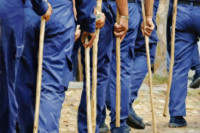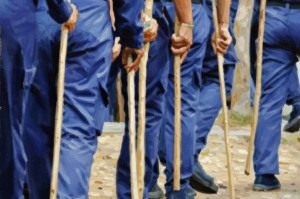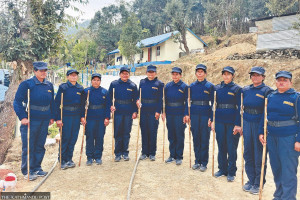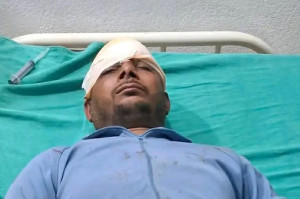Sudurpaschim Province
Illegal extraction of riverbed materials goes unchecked in Bajhang
Rampant extraction in Bajhang has increased erosion risk of infrastructures like bridges and roads, say locals.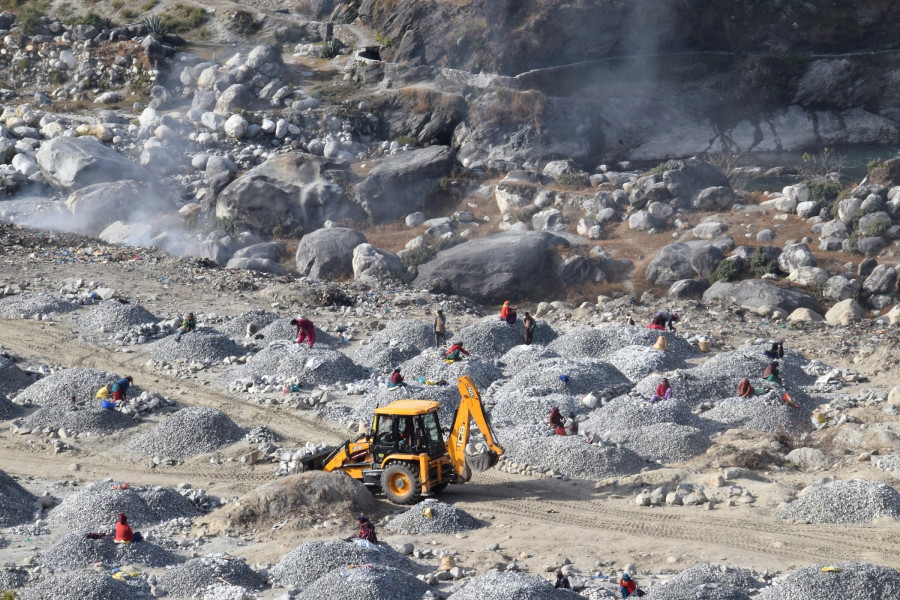
Basant Pratap Singh
The practice of illegal extraction of sand, pebbles and stones in several rivers and rivulets of Bajhang district still continues. Locals say that the illegal mining, which that stands to threaten the fragile ecosystem of the region, continues because of the lackadaisical response of the authorities and the people’s representatives to this problem.
Because of the rampant extraction of riverbed materials, large-scale infrastructure like bridges and roads are at high risk of erosion. Irrigation projects too are on the verge of closure since, with haphazard extraction, the water level in the water bodies have begun to recede. The mining has also exposed arable lands to floods, say locals.
“Around 50-60 trucks full of sand, pebbles and stones are extracted and transported from the banks of the Seti river every day. They are using dozers and excavators to extract river products. All this is happening in broad daylight but the government employees and people’s representatives are turning a blind eye to it,” said Lokendra Giri, a Paringal local.
Such illegal mining practices is unabated in Bhopur, Sailabagar, Ratapani, Tamail, Paringal, Rayal, Deura among other places that lie on the banks of the Seti and Bahuligad rivers near Chainpur, the district headquarters.
The exploitation of riverbed materials is also the same in Sunigad, Kalangagad, Tarugad, Jadarigad, among other streams in the district.
According to existing legal provisions, riverbed materials like sand, pebbles and stones cannot be extracted without conducting an environmental impact assessment or initial environmental examination. The law also forbids sand and pebble mining within 500 metres upstream and downstream from a bridge, irrigation dam and other infrastructure. However, the laws are being openly disregarded in Bajhang.
Floods in the Bahuligad had swept away a suspension bridge two years ago. Technicians said the bridge collapsed because the boulders around it were removed leaving the structure exposed to floods. According to them, the only motorable bridge across the Bahuligad river is also at high risk of flooding now.
“Water level in the river decreases if the riverbed materials are extracted excessively. Such extraction is not taken into consideration while designing bridges which has further exacerbated the risk. The design of the bridges are not faulty, it’s what happens after the bridge is built that leads to a bridge collapse,” said Ain Bahadur Singh, chief engineer of the Seti Highway Project Office. The bridges and roads constructed along the Bahuligad river are at high risk of collapse, he added.
Rampant mining has also left several irrigation projects on the brink of closure. Prabinda Dhami of Rithapata said the locals were compelled to move Debal Jiulo Irrigation Canal’s dam 10 times in the past seven years. “Exploitation of sand and stone decreased the water level in the stream. So the dam had to be shifted a few metres upstream every year. At this rate, the irrigation canal will be defunct in the next four years,” said Dhami. The project provides water to around 60 hectares of land in the area.
Dhaulabagar Irrigation Project, which irrigates around 20 hectares of land in Dhaulabagar Jiulo, was closed a few years ago as the water level in the Seti river receded.
The forest officials and conservationists are worried about the possible crisis in the near future if the authorities fail to control rampant extraction right away. “Illegal mining must be controlled and regulated at the earliest. The extraction is being done without environmental survey, which is a very dangerous practice,” said Mangal Khadka, district secretary of Federation of Community Forest Users Nepal.
Overexploitation of the riverbed has also pushed aquatic animals into a crisis. According to Khadka, the number of fish has sharply declined in the Seti river and other streams in recent years in Bajhang mainly due to haphazard extraction of riverbed materials, and river pollution.
Jaya Prithvi Municipality claims that environmental surveys were conducted in most of the places before extraction of riverbed materials began. Mangal Bahadur Shahi, the chief executive officer of the municipality, however, admitted that the on-going sand and stone extraction near a motorable bridge in Bahuligad is illegal. “Yes, the extraction near the bridge is illegal. They do not have permission for that. We wrote to the district administration office a while back but they haven’t responded,” said Shahi.
According to him, why the extraction is unchecked is also because local units are in collusion with construction companies for profits.
When asked about the unchecked extraction of sand and stone in general and the case of Bahuligad river in particular, Chief District Officer Umesh Pandey assured of stringent action against the guilty. He admitted to having received a letter from Jaya Prithvi Municipality about the matter. “We have instructed the police to look into illegal extraction happening in Bahuligad,” he said.




 8.75°C Kathmandu
8.75°C Kathmandu


